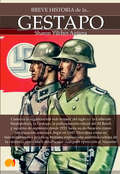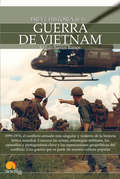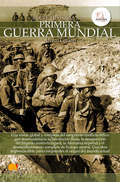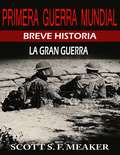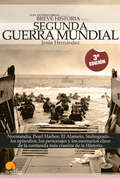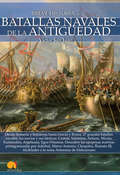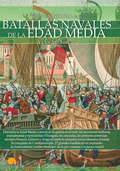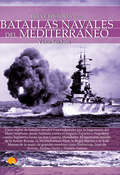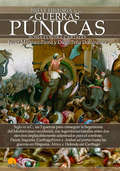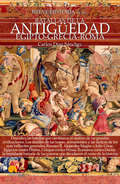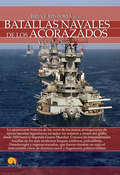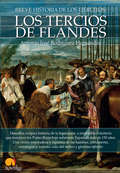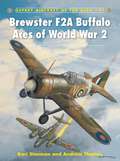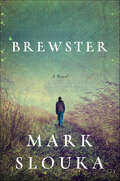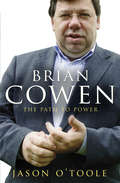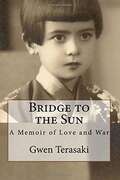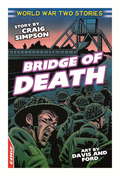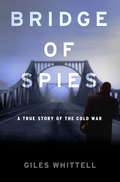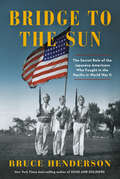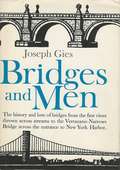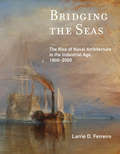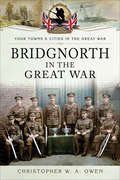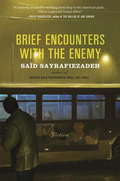- Table View
- List View
Breve historia de la Gestapo (Breve Historia)
by Sharon Vilches AgüeraConozca la Germain Statepolizei, más conocida como Gestapo, un símbolo en el imaginario general sobre los principios de la brutalidad y el control social. Entre sus filas se encontraban personas normales, apoyados por personas normales que sustentaron actos anormales. Breve historia de la Gestapo busca las claves de esta temible organización a través del estudio de las culturas políticas que la sustentaron y posibilitaron que estuviese por encima, incluso de las leyes nacionalsocialistas. En Berlín, el edificio situado en la calle Prinze-Alberch número 8 causa aún un escalofrío al pasar junto a él. Detrás de su robusta puerta se encontraba la sede berlinesa de la organización más temida del siglo XX, la Gestapo. Acérquese a ella de la mano de Sharon Vilches, una especialista en el tema que realiza en esta obra un estudio completo, pormenorizado y transversal de esta organización desde su nacimiento hasta su legado.
Breve historia de la Guerra de Vietnam (Breve Historia)
by Raquel Barrios Ramos1959-1976, el conflicto armado más singular y violento de la historia bélica mundial.Conozca las armas, estrategias militares, los episodios y protagonistas clave y las repercusiones geopolíticas de un choque que marcó un antes y un después en la segunda mitad del siglo XX. Descubra por qué la guerra de Vietnam y la épica derrota de los Estados Unidos son ya parte de la cultura colectiva. Breve historia de la guerra de Vietnam le mostrará de una forma concisa, clara y sin complicaciones innecesarias el enfrentamiento entre las dos grandes superpotencias durante la Guerra Fría. Conozca un episodio clave de la reciente historia de la humanidad que marcó un antes y un después en la historia bélica mundial; su repercusión en la evolución de las relaciones internacionales y profundice en la forma en que el conflicto se llevó a cabo y le confirió su especificidad. Raquel Barrios Ramos, doctora en Historia Contemporánea y Premio Nacional del Ministerio de Defensa en 2007, le acompañará y le proporcionará las claves que le permitan conocer los entresijos de la guerra que supuso el más serio fracaso de los Estados Unidos en la Guerra Fría
Breve historia de la Primera Guerra Mundial (Breve Historia)
by Álvaro LozanoUna visión global y completa del sangriento conflicto bélico que desencadenaría la Revolución rusa, la desaparición del Imperio austro-húngaro, la Alemania imperial y el desmembramiento completo de Europa central. Esta obra abarca el desarrollo completo de la Primera Guerra Mundial, desde la batalla de Marne en 1914, a Gallipolli, el Somme, el horror de las ofensivas de 1917, la ofensiva alemana de 1918 y las consecuencias de la guerra.
Breve historia de la Primera Guerra Mundial. La Gran Guerra.
by Scott S. F. Meaker I. FernandezBreve historia de la Primera Guerra Mundial La Gran Guerra. La Gran Guerra iba a ser la que terminase con todas las guerras, de ahí su nombre. Desde la perspectiva de los alemanes, el conflicto empezó con mal pie. El plan era ahuyentar a Francia y Rusia y centrarse en ayudar a Austro-Hungría a lidiar con Serbia. En la Gran Guerra se perdieron numerosas vidas.
Breve historia de la Segunda Guerra Mundial (Breve Historia)
by Jesús Hernández MartínezUn relato vívido y riguroso de la Segunda Guerra Mundial realizado por uno de los grandes especialistas en castellano en la materia. Una obra diferente que incluye una guía para visitar los lugares donde tuvieron lugar los hechos más significativos. Todas las batallas, campañas y personajes que protagonizaron el conflicto más importante de la historia se dan cita en esta obra imprescindible.
Breve historia de las Batallas navales de la Antigüedad (Breve Historia)
by Víctor San JuanDesde Sumeria y Babilonia hasta Grecia y Roma: 27 grandes batallas navales, los navíos y sus tácticas: Cumas, Salamina, Actium, Micala, Eurimedón, Arginusas, Egos Pótamos. Descubra las epopeyas marinas protagonizadas por Octavio Augusto, Marco Antonio, Cleopatra, Ramsés III, Agripa o la reina Artemisia de Halicarnaso. Acérquese a las batallas navales más importantes de la Antigüedad, desde las protagonizadas por remotas civilizaciones como Sumer o Babilonia hasta Salamina en la historia de Grecia o la clásica batalla de Actium. Con Breve historia de las batallas navales de la Antigüedad, descubrirá que ya había enfrentamientos navales antes de los romanos, pues apenas se conoce que Sumer o Babilonia montaron primitivas operaciones marítimas, que Egipto libró la primera batalla naval conocida en 1109 a. C., que etruscos, fenicios y griegos lucharon por las islas de Sicilia, Córcega y Cerdeña o que, después de Salamina, los victoriosos atenienses conocerían el desastre en cuatro porfiadas batallas navales en torno a Siracusa frente a la Liga del Peloponeso espartana. De la mano de su autor, Víctor San Juan, especialista en temas náuticos, que une conocimiento histórico, conocimiento técnico y experiencia práctica, descubrirá todas las claves, el desarrollo y los personajes que ocuparon un lugar destacado. Una obra que con un estilo riguroso y ameno le mostrará los conflictos navales más importantes de la Antigüedad.
Breve historia de las Batallas navales de la Edad Media (Breve Historia)
by Víctor San JuanDescubra la Edad Media a través de la guerra en el mar: las invasiones bárbaras, musulmanas y normandas (Vikingos), las cruzadas, las primeras potencias navales (Venecia, Génova y Aragón) hasta la campaña naval otomana durante la conquista de Constantinopla. 27 grandes batallas en un momento de trascendental cambio histórico: de la pax romana a la época feudal. Acérquese a las batallas navales más importantes de la Edad Media, las invasiones bárbaras y la irrupción de nuevos pueblos, los vikingos a bordo de sus drakkars, la invasión de Hispania por los árabes comandada por Tarik ibn Ziyad o la conquista normanda de Inglaterra por Guillermo el Conquistador, así como las cruzadas, en las que se libraron batallas como la conquista de Lisboa o la primera Toma de Constantinopla. Con Breve historia de las batallas navales de la Edad Media, conocerá 27 grandes batallas y operaciones navales medievales, expuestas de forma sencilla y cronológica; trece siglos en los que abundaron las operaciones navales por motivos teológicos en algunas ocasiones, ansias de riqueza en otras o la búsqueda de un lugar donde asentarse. La historia del trascendental cambio que se produjo del imperio a la época feudal y sus implicaciones navales. De la mano de su autor, Víctor San Juan, especialista en temas náuticos, que une conocimiento histórico, conocimiento técnico y experiencia práctica, descubrirá todas las claves, el desarrollo y los personajes que ocuparon un lugar destacado en estas interesantes batallas. Una obra que con un estilo riguroso y ameno le mostrará los conflictos navales más importantes de la Edad Media.
Breve historia de las Batallas navales del Mediterráneo (Breve Historia)
by Víctor San JuanCinco siglos de batallas navales trascendentales por la hegemonía del Mare Nostrum: desde Solimán contra el Imperio Español o Napoleón contra Inglaterra hasta las dos Guerras Mundiales. El fascinante mundo de la Armée Royale, la Mediterranean Fleet, la Regia Marina o la KuK Marine de la mano de grandes nombres como Barbarroja, Juan de Austria, Andrea Doria o Horacio Nelson. Breve historia de las batallas navales en el Mediterráneo es el tercer título de nuestra serie sobre batallas navales (Breve historia de las batallas navales de la Antigüedad y Breve historia de las batalles navales e la Edad Media). En esta ocasión podrá disfrutar de la historia de la pugna por el dominio marítimo en el Mediterráneo durante cinco siglos a través de grandes batallas navales como Zonchio (1499), Preveza (1538), Agosta (1675), Aboukir (1798), Tarento (1940) o Matapán (1941), en las que se decidió qué buques podrían navegar por él y cuáles no; legendarios enfrentamientos entre galeras, galeones, navíos, acorazados y portaaviones que cambiarían la forma de combatir quedando inscritos para siempre en las páginas de la Historia Naval. Mientras navegantes y conquistadores se abrían paso en los océanos Atlántico y Pacífico, en aguas del Mare Nostrum diversos actores han impuesto su ley con sus flotas en las diferentes épocas. Sucesivos imperios quisieron dominar sus aguas, destacando el poder Otomano, el imperio español, la Armée Royale francesa, la Mediterranean Fleet británica, la Regia Marina italiana o la KuK Marine austro-húngara. Grandes nombres se han significado en esta lucha como Solimán El Magnífico, Barbarroja, Juan de Austria, Andrea Doria, el duque de Osuna, Abraham Duquesne y Horacio Nelson entre otros.
Breve historia de las Guerras Púnicas (Breve Historia)
by Javier Martínez-PinnaAmílcar Barca, Asdrúbal, Escipión el Africano, Cátulo, Aníbal Barca,… Conozca los mayores enfrentamientos de la Antigüedad. Las dos guerras mundiales en que se enfrentaron Cártago y Roma.En el siglo III a. C. dos grandes potencias, Roma y Cartago, se encontraban preparadas para iniciar una larga lucha por conseguir la hegemonía en el Mediterráneo occidental. Del resultado de esta contienda se iba a dirimir el destino del mundo tal y como lo conocemos en la actualidad. Las guerras púnicas enfrentaron a dos ejércitos perfectamente adiestrados para el combate, con dos visiones distintas a la hora de planificar las principales operaciones militares, y con unos experimentados generales, como Aníbal o Escipión, que protagonizaron algunas de las batallas más memorables de todos los tiempos. Tal fue su magnitud y su extensión, que muchos autores la han considerado como la primera guerra mundial de la historia, y uno de sus escenarios principales estuvo aquí, en España. Durante la lectura de la Breve historia de las Guerras Púnicas el lector podrá acompañar a Aníbal hacia los Alpes dilucidando a la vez si este fue su gran plan desde el principio o si, en cambio, fue una decisión de última hora debido a las circunstancias. Sufrirá la angustia romana de la mano de Publico Cornelio Escipión padre, verá a los cartagineses afrontar temibles batallas, que no son sólo historia sino casi leyenda, a lomos de sus poderosos elefantes de guerra. Temblará con los ciudadanos latinos encerrados en la ciudad de Roma, subidos en las murallas y con la vista puesta en el horizonte esperando ver aparecer a Aníbal y su temible ejército de mercenarios con la intención de destruir la ciudad y esclavizarlos a todos. Y reirá con la descripción de las mejores comedias de Plauto, precursor de la comedia de situación más moderna, justo cuando su mundo se estaba viniendo abajo.
Breve historia de las batallas de la Antigüedad: Egipto, Grecia y Roma (Breve Historia)
by Carlos Díaz SánchezDescubra las batallas que cambiaron el destino de las grandes civilizaciones. Los detalles de las tropas, armamentos y las tácticas de los más brillantes generales, Ramses II, Alejandro Magno o Julio César. Egipcios contra Hititas, Griegos contra Persas, Romanos contra Dacios: la trepidante historia de las guerras que decidieron el curso de la historia. Megido, Qadesh, Platea, Termópilas, Gaugamela, Cannas, Alesia… Los conflictos armados siempre han sido el método favorito para legitimarse entre diferentes culturas. La Breve historia de las Batallas de la Antigüedad nos adentra en los problemas que tuvieron algunos faraones al enfrentarse contra el exterior; cómo los griegos lucharon por su forma de vida contra los persas o, cómo Roma consiguió tener tanto territorio en poco tiempo. A través del recorrido de las diferentes batallas analizaremos el desarrollo de las grandes culturas (egipcia, griega y romana), desde su plenitud hasta su colapso. La Breve historia de las Batallas de la Antigüedad es una síntesis de los grandes conflictos que marcaron el desarrollo de la historia antigua, conozca los conflictos que marcaron el devenir del mundo clásico a través de la documentación histórica y arqueológica de las culturas del pasado.
Breve historia de las batallas navales de los acorazados (Breve Historia)
by Víctor San JuanLa apasionante historia de los reyes de los mares, protagonistas de épicas hazañas legendarias en todos los océanos y mares del globo, desde 1850 hasta la Segunda Guerra Mundial. Conozca las trascendentales batallas de los más modernos buques artilleros, policalibres, Dreadnought y superacorazados, que fueron durante un siglo el instrumento clave de dominio naval y hegemonía político-militar. Desde siempre, la pretensión del guerrero ha sido ir al combate protegido por una armadura o coraza; este antiguo anhelo no se pudo aplicar a la embarcación hasta el siglo XIX, cuando la Revolución Industrial permitió revestir veleros de casco de madera con planchas metálicas. El acorazado, sin embargo, no conocerá su definitiva conformación hasta que incorpore revolucionarias máquinas de vapor y artillería de última generación. Todos estos conceptos, materializados en el italiano Duilio de 1876 y llevados a la máxima expresión con el británico Dreadnought de 1906 marcarán la historia del buque blindado en batallas universales como Tsushima (1905), Jutlandia (1916) o Golfo de Leyte (1944). Los acorazados dejaron escrito casi un siglo como «reyes de los mares», terminando su ejecutoria con nombres célebres de la SGM como Hood, Bismarck, Yamato o Jean Bart, protagonistas de épicas hazañas legendarias.
Breve historia de los Tercios de Flandes (Breve Historia)
by Antonio José Rodríguez HernándezConozca la caballería medieval con sus grandes aventuras, intrigas, batallas, sus armas y personajes más famosos, así como la heráldica, las cruzadas, torneos y combates míticos. La historia de unos guerreros con un código de honor propio desde su formación y su investidura hasta su fin con la aparición del arco, la pica y la pólvora. La obra cubrirá todos los aspectos relacionados con la caballería en la Edad Media, haciendo lógicamente la misma evolución que hizo esta a lo largo de los siglos, tanto en el libro en general como en cada capítulo concreto en el que se trata un tema cerrado. La caballería no se puede comprender sin saber cómo se organizaba la sociedad medieval, el papel que jugaba cada uno de los grupos sociales y su forma de vida, por lo que esos aspectos se tratarán para centrar el contexto. Una vez situado el caballero en la sociedad, es hora de conocer con profundidad los distintos aspectos de la caballería, cómo los hombres llegaban a formarse como caballeros, así como las armas, armaduras, animales… que utilizaban. En sus varios siglos de historia todo esto fue evolucionando y la obra explicará el porqué de los cambios. La caballería tenía un objetivo fundamental, el combate y la guerra, y se explicarán las diferentes formas que tenía un caballero de luchar, tanto individualmente como en grupo. Y nada mejor que adentrarse en hechos reales, en las batallas históricas más relevantes para casi verlo de primera mano. Los cruzados y otros monjes guerreros también son tratados como caballeros que fueron, con sus particularidades e historia. Y para completar los conocimientos sobre la caballería, no se pueden dejar de lado los mitos de la cultura popular y se explicará qué hay de cierto, mientras se desmienten algunos mitos muy extendidos.
Brewster F2A Buffalo Aces of World War 2
by Chris Davey Kari StenmanEntering service with the US Navy as a carrier-borne fighter, the Brewster F2A, later named Buffalo by the British and simply the Brewster by the Finns, saw relatively little service with its own nation. Indeed, it was to see action on just one occasion in US colors: the engagement off Midway by USMC F2As saw a number of Japanese carrier aircraft shot down, including two by future ace Col Charles M Kunz. The F2A was also ordered for the RAF in 1939, and although it soon became apparent that the type was not suitable for use against the mighty Luftwaffe over Western Europe, the Buffalo was seen as a suitable type for use in the Far East. It was sent en-masse to equip new squadrons of the RAF, RAAF and RNZAF formed for the defence of Malaya and Singapore. Despite the many inadequacies exposed after the Japenese invasion, the Commonwealth units fought gallantly against the odds and with poor logistical backup and ultimately made many claims. Indeed no fewer than nine pilots either became aces on the type or increased their scores to achieve acedom, and a further fifteen aces flew them in action. Moreover, the leading Buffalo ace went on to become the most successful Commonwealth pilot against the Japanese of the entire war. It was in Finland, however, where the Brewster found undying fame and proved itself a real thorn in the side of the Soviets. Operating in primitive conditions and against superior numbers, Finnish Brewster 239 pilots racked up an incredible score against the Red Air Force. Overall, some 37 Finnish pilots became aces when flying the Brewster 239. The tubby Brewster was very much the fighter of choice for the leading Finnish pilots until the advent of large numbers of Messerschmitt Bf 109s in 1943.
Brewster: A Novel
by Mark Slouka"Intense and elegiac…devastatingly agile." —New York Times Book ReviewThe year is 1968. The world is changing, and sixteen-year-old Jon Mosher is determined to change with it. Racked by guilt over his older brother’s childhood death and stuck in the dead-end town of Brewster, New York, he turns his rage into victories running track. Meanwhile, Ray Cappicciano, a rebel as gifted with his fists as Jon is with his feet, is trying to take care of his baby brother while staying out of the way of his abusive, ex-cop father. When Jon and Ray form a tight friendship, they find in each other everything they lack at home, but it’s not until Ray falls in love with beautiful, headstrong Karen Dorsey that the three friends begin to dream of breaking away from Brewster for good. Freedom, however, has its price. As forces beyond their control begin to bear down on them, Jon sets off on the race of his life—a race to redeem his past and save them all.Mark Slouka's work has been called "relentlessly observant, miraculously expressive" (New York Times Book Review). Reverberating with compassion, heartache, and grace, Brewster is an unforgettable coming-of-age story from one of our most compelling novelists.A New York Times Book Review Editor’s Choice A Washington Post Notable Book of 2013 A Barron’s Favorite Book of the Year, selected by Daniel Woodrell A Booklist Best Adult Books for Young Adults Editor’s Choice 2013
Brian Cowen: The Path to Power
by Jason O'TooleMeet Ireland's new Taoiseach, Brian CowenDespite a high profile at the centre of Irish political life for more than twenty years, relatively little is known about our new leader. Just who is Brian Cowen?The story begins in the village of Clara, Co. Offaly, where family, local life and the GAA were formative influences. The sudden and unexpected death of his father, Ber Cowen, Fianna Fáil TD for Laois Offaly, thrust a twenty-four year-old Cowen into the heart of Irish politics. After an eight-year apprenticeship on the back benches, Cowen was appointed to his first ministerial position by Albert Reynolds and later went on to hold the senior cabinet positions of Health, Foreign Affairs and Finance. By the time of Bertie Ahern's resignation, Cowen's standing in the party was such that his election to the leadership of Fianna Fáil seemed inevitable. On 7 May 2008, Brian Cowen became Ireland's eleventh Taoiseach. Here, for the first time, is a portrait of Brian Cowen which follows his remarkable life story, tracing the road to power from early childhood right up to his eventful early months in the office of An Taoiseach.
Bridge To The Sun: A Memoir Of Love And War
by Gwen Terasaki Mariko Terasaki MillerNational Book Award Finalist Non-Fiction (1958) * Washington Post Non-Fiction Book of the Year (1958) * New York Times Bestseller Bridge to the Sun is a beautiful, tender, and moving love story-the true report of an international and interracial marriage of a an American girl from the mountains of Tennessee and a Japanese diplomat. They were married in 1931, just as tension between their two countries was mounting, and their constant dream was of a "rainbow across the Pacific," a bridge of peace between Japan and the United States. In the following ten years, Mr. Terasaki's service with the Japanese Foreign Office took them to Japan, China (where their daughter Mariko was born), Cuba, and Washington, where they were living at the time of the attack on Pearl Harbor. As head of Japanese intelligence in the Western Hemisphere, Terasaki took enormous personal risks to avert war between the two countries. Mrs. Terasaki describes with rare perception and fine humor her months of internment with the Japanese diplomatic corps at Hot Springs and White Sulphur Springs, the long voyage back to Japan via Africa on the famed exchange ship Gripsholm, and the struggle of the war years in Japan which were marked by illness and near starvation. After the surrender, Mr. Terasaki, a courageous and brilliant man who had risked everything to avert the war, was appointed liaison between the Emperor and General MacArthur, and in this capacity, he made a lasting contribution to post-war relations between the two countries.
Bridge of Death (EDGE: World War Two Short Stories #1)
by Craig SimpsonIt's D-Day, 6th June 1944. Ten minutes after midnight. A small British force is flying over Occupied France on what is virtually a suicide mission - they must capture a bridge before German forces guarding it can blow it up. There's no room for error. They must cast fear aside in this race against time, told from both a British and German perspective. This title is published by Franklin Watts EDGE, which produces a range of books to get children reading with confidence. EDGE - for books kids can't put down.
Bridge of Spies: A True Story of the Cold War
by Giles WhittellThe dramatic events behind the film, BRIDGE OF SPIES. Who were the three men the American and Soviet superpowers exchanged at Berlin's Glienicke Bridge and Checkpoint Charlie in the first and most legendary prisoner exchange between East and West? Bridge of Spies vividly traces their paths to that exchange on February 10, 1962, when their fate helped to define the conflicts and lethal undercurrents of the most dangerous years of the Cold War.Bridge of Spies is the true story of three extraordinary characters – William Fisher, alias Rudolf Abel, a British born KGB agent arrested by the FBI in New York City and jailed as a Soviet superspy for trying to steal America’s most precious nuclear secrets; Gary Powers, the American U-2 pilot who was captured when his plane was shot down while flying a reconnaissance mission over the closed cities of central Russia; and Frederic Pryor, a young American graduate student in Berlin mistakenly identified as a spy, arrested and held without charge by the Stasi, East Germany’s secret police. By weaving the three strands of this story together for the first time, Giles Whittell masterfully portrays the intense political tensions and nuclear brinkmanship that brought the United States and Soviet Union so close to a hot war in the early 1960s. He reveals the dramatic lives of men drawn into the nadir of the Cold War by duty and curiosity, and the tragicomedy of errors that eventually induced Khrushchev to send missiles to Castro. Two of his subjects — the spy and the pilot — were the original seekers of weapons of mass destruction. The third, an intellectual, fluent in German, unencumbered by dependents, and researching a Ph.D. thesis on the foreign trade system of the Soviet bloc, seemed to the Stasi precisely the sort of person the CIA should have been recruiting. He was not. In over his head in the world capital of spying, he was wrongly charged with espionage and thus came to the Agency’s notice by a more roundabout route. The three men were rescued against daunting odds by fate and by their families, and then all but forgotten. Yet they laid bare the pathological mistrust that fueled the arms race for the next 30 years. Drawing on new interviews conducted in the United States, Europe and Russia with key players in the exchange and the events leading to it, among them Frederic Pryor himself and the man who shot down Gary Powers, Bridge of Spies captures a time when the fate of the world really did depend on coded messages on microdots and brave young men in pressure suits. The exchange that frigid day at two of the most sensitive points along the Iron Curtain represented the first step back from where the superpowers had stood since the building of the Berlin Wall the previous summer – on the brink of World War III.From the Hardcover edition.
Bridge to the Sun: The Secret Role of the Japanese Americans Who Fought in the Pacific in World War II
by Bruce HendersonOne of the last, great untold stories of World War II—kept hidden for decades—even after most of the World War II records were declassified in 1972, many of the files remained untouched in various archives—a gripping true tale of courage and adventure from Bruce Henderson, master storyteller, historian, and New York Times best-selling author of Sons and Soldiers—the saga of the Japanese American U.S. Army soldiers who fought in the Pacific theater, in Burma, Iwo Jima, Okinawa, with their families back home in America, under U.S. Executive Order 9066, held behind barbed wire in government internment camps. After Japan's surprise attack on Pearl Harbor, the U.S. military was desperate to find Americans who spoke Japanese to serve in the Pacific war. They soon turned to the Nisei—first-generation U.S. citizens whose parents were immigrants from Japan. Eager to prove their loyalty to America, several thousand Nisei—many of them volunteering from the internment camps where they were being held behind barbed wire—were selected by the Army for top-secret training, then were rushed to the Pacific theater. Highly valued as expert translators and interrogators, these Japanese American soldiers operated in elite intelligence teams alongside Army infantrymen and Marines on the front lines of the Pacific war, from Iwo Jima to Burma, from the Solomons to Okinawa. Henderson reveals, in riveting detail, the harrowing untold story of the Nisei and their major contributions in the war of the Pacific, through six Japanese American soldiers. After the war, these soldiers became translators and interrogators for war crime trials, and later helped to rebuild Japan as a modern democracy and a pivotal U.S. ally.
Bridges and Men
by Joseph GiesSince human time first began, men have needed to cross streams and valleys, span chasms and torrents—and have found ways of getting to the other side. In this sweeping historic survey, Joseph Gies, author of Adventure Underground: The Story of the World’s Great Tunnels, recounts for our pleasure the history of bridges through the ages.From the first vines thrown across small streams to the Verrazano-Narrows Bridge across the entrance to New York Harbor and to plans for possible bridges across the English Channel and the Straits of Messina, Mr. Gies interests us in the men who dreamed bridges and built them; in the terrible catastrophes of bridges that collapsed—including that across the First of Tay and “Galloping Gertie” across the Tacoma Narrows; in painters and poets and novelists who have found their inspiration in or on bridges.In large part, that is, BRIDGES AND MEN is about practical visionaries who combined the genius of engineers and architects, the talents of propagandists and business men: The Bridge Brothers, who built the world-faced Pont d’Avignon; Jean-Rodolphe Perronet, who built the Pont de la Concorde; john Rennie, the Scottish farmer boy who built New London Bridge; George and Robert Stephenson, who invented the railroad and railroad bridge; and Thomas Telford, who bridged the ocean at Menai Strait.
Bridging the Seas: The Rise of Naval Architecture in the Industrial Age, 1800-2000 (Transformations: Studies in the History of Science and Technology)
by Larrie D. FerreiroHow the introduction of steam, iron, and steel required new rules and new ways of thinking for the design and building of ships.In the 1800s, shipbuilding moved from sail and wood to steam, iron, and steel. The competitive pressure to achieve more predictable ocean transportation drove the industrialization of shipbuilding, as shipowners demanded ships that enabled tighter scheduling, improved performance, and safe delivery of cargoes. In Bridging the Seas, naval historian Larrie Ferreiro describes this transformation of shipbuilding, portraying the rise of a professionalized naval architecture as an integral part of the Industrial Age. Picking up where his earlier book, Ships and Science, left off, Ferreiro explains that the introduction of steam, iron, and steel required new rules and new ways of thinking for designing and building ships. The characteristics of performance had to be first measured, then theorized. Ship theory led to the development of quantifiable standards that would ensure the safety and quality required by industry and governments, and this in turn led to the professionalization of naval architecture as an engineering discipline. Ferreiro describes, among other things, the technologies that allowed greater predictability in ship performance; theoretical developments in naval architecture regarding motion, speed and power, propellers, maneuvering, and structural design; the integration of theory into ship design and construction; and the emergence of a laboratory infrastructure for research.
Bridgnorth in the Great War (Your Towns & Cities in the Great War)
by Christopher W. OwenThis social history of WWI explores the wartime sacrifices and contributions made by the people of this charming, historic English town. The town of Bridgnorth, located along the Severn River in Shropshire, is a popular tourist destination known for its historic castle and unique funicular rail system. Though it is steeped in military history, much of its role during the Great War has remained obscure until now. Misled by government propaganda, many of Bridgnorth&’s men enlisted in the military for what they thought would be a short-term adventure. Their commitment and fortitude in the face of bloody trench warfare gives testament to the incredible bravery of the people of Bridgnorth, and their losses are evidenced in the various commemorative monuments erected throughout the town and surrounding hamlets. Utilizing contemporary documents and wartime servicemen's poignant letters, some of which are disclosed here for the first time, Bridgnorth in the Great War reveals how this once prosperous and industrious West Midlands' town endured great sacrifice in the name of Britain&’s war effort.
Bridgnorth in the Great War (Your Towns & Cities in the Great War)
by Christopher W. OwenThis social history of WWI explores the wartime sacrifices and contributions made by the people of this charming, historic English town. The town of Bridgnorth, located along the Severn River in Shropshire, is a popular tourist destination known for its historic castle and unique funicular rail system. Though it is steeped in military history, much of its role during the Great War has remained obscure until now. Misled by government propaganda, many of Bridgnorth&’s men enlisted in the military for what they thought would be a short-term adventure. Their commitment and fortitude in the face of bloody trench warfare gives testament to the incredible bravery of the people of Bridgnorth, and their losses are evidenced in the various commemorative monuments erected throughout the town and surrounding hamlets. Utilizing contemporary documents and wartime servicemen's poignant letters, some of which are disclosed here for the first time, Bridgnorth in the Great War reveals how this once prosperous and industrious West Midlands' town endured great sacrifice in the name of Britain&’s war effort.
Brief Encounters with the Enemy
by Said SayrafiezadehThe first short story collection from a writer who calls to mind such luminaries as Denis Johnson, George Saunders, and Nathan EnglanderWhen The New Yorker published a short story by Saïd Sayrafiezadeh in 2010, it marked the emergence of a startling new voice in fiction. In this astonishing book, Sayrafiezadeh conjures up a nameless American city and its unmoored denizens: a call-center employee jealous of the attention lavished on a co-worker newly returned from a foreign war; a history teacher dealing with a classroom of maliciously indifferent students; a grocery store janitor caught up in a romantic relationship with a kleptomaniac customer. These men's struggles and fleeting triumphs--with women, with cruel bosses, with the morning commute--are transformed into storytelling that is both universally resonant and wonderfully strange. Sometimes the effect is hilarious, as when a would-be suitor tries to take his sheltered, religious date on a tunnel of love carnival ride. Other times it's devastating, as in the unforgettable story that gives the book its title: A soldier on his last routine patrol on a deserted mountain path finally encounters "the enemy" he's long sought a glimpse of. Upon giving the author the Whiting Writers' Award for his memoir, When Skateboards Will Be Free, the judges hailed his writing as "intelligent, funny, utterly unsmug and unpreening." These fiercely original stories show their author employing his considerable gifts to offer a lens on our collective dreams and anxieties, casting them in a revelatory new light.One of New York's 100 Most Important Living Writers as ranked by Flavorwire * One of TheMillions.com's Most Anticipated Books for the Second Half of 2013 * One of Paste's 20 New Books to Read This Summer * A Los Angeles Times Summer Preview Pick "A tantalizing fiction debut . . . [that] menaces and mesmerizes."--Elle"Saïd Sayrafiezadeh is a masterly storyteller, working from deep in the American grain. This is a splendid fiction debut."--Philip Gourevitch, author of The Ballad of Abu Ghraib "In this beautiful collection, we see the wages of war, brought very close to home."--Dani Shapiro, author of Devotion "Bizarre and compelling and painfully funny, and something else, too: important."--John Wray, author of Lowboy "A vivid collection about the indignities and consolations of dead-end jobs, the joy of a stolen kiss, and the mysteries of friendship."--Nathaniel Rich, author of Odds Against Tomorrow "Saïd Sayrafiezadeh is a slyly subversive absurdist whose true subject is the deeply serious matter of our obligations to one another as human beings."--John Burnham Schwartz, author of Northwest Corner "Fun, moving, and reads like the work of a master."--Darin Strauss, author of Half a Life "Gritty, compelling stories about our embattled working class. This is a thrilling report from the trenches."--Edmund White, author of Jack Holmes and His Friend"An arresting fiction debut . . . With insightful humor and a keen eye for offbeat details, Sayrafiezadeh, entertaining and political without being heavy-handed, is a force to be reckoned with."--Booklist
